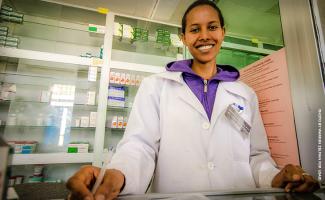Ethiopia has made impressive strides to strengthen public health systems over the past decade. However, results have been uneven, with both quality of services and equitable access remaining as challenges. Recurring drought, conflict and disease outbreaks often hamper the country’s progress towards its goal to provide high quality health services to all of its citizens.
In response, USAID works closely with the Government of Ethiopia to address these challenges and sustainably improve both the quality of and access to essential health services to ensure that Ethiopia is better able to plan, implement and finance their own health programming. We focus on building the capacity of healthcare professionals and extension workers to equip them with the skills needed to better serve their communities, and have supported training for 50,000 health managers and providers over the past several years. USAID also promotes digital health information systems to improve the accuracy of information and to support the availability of pharmaceuticals, medicines and good quality health products for patients.
In addition to improvements in quality and capacity, USAID programs work to ensure health services are accessible and affordable to everyday citizens, particularly the most vulnerable, including mothers and children. USAID supported the Government of Ethiopia to establish community-based health insurance, which now provides coverage for over 20 million Ethiopians. This helps families withstand medical emergencies and contributes to our greater objectives of partnering with Ethiopia to achieve a stronger and more resilient health system that can meet the needs of all citizens.
KEY ACTIVITIES
- The USAID Health Financing Improvement Program continues to expand coverage of affordable community-based health insurance to millions of citizens across the country. So far, more than 20 million people have availed the program, which significantly reduces out-of-pocket expenses from medical bills and emergency care.
- The USAID Health Workforce Improvement Program works closely with and enhances the capacity of the Ministry of Health and Ministry of Science and Higher Education to improve quality of health professional education and training, health sector human resources planning and management, conducting research and generating information to improve health sector human resources through evidence-based decision-making.
- The USAID Digital Health Activity works hand-in-hand with the Ministry of Health to incorporate digital technology and tools to improve data management across national and regional digital information platforms to track supply chain management systems, record and store vital data on patients and clients, health workforce stock and distribution, and improve overall efficiency at administrative, health facility, and community levels.
- The USAID Global Health Supply Chain–Procurement and Supply Management (GHSC PSM) activity supports the Ministry of Health, Ethiopian Pharmaceuticals Supply Agency, and Regional Health Bureaus to strengthen the public health supply chain system and ensure equitable access to affordable medicines and medical equipment and supplies in Ethiopia.
- The USAID Promote Quality of Medicine (PQM+) activity works with the Ethiopian Food and Drug Administration and Regional Health Bureaus to enhance health regulatory systems and capacity to strengthen quality assurance of medical products in Ethiopia in a sustainable way.
KEY RESOURCES
- Fact Sheet: Health Systems Strengthening Programs in Ethiopia [PDF 230 KB]
- News: USAID Invests in Digital Solutions to Modernize Ethiopia Health System
- News: U.S. Investments Improve Skills of Nearly 50,000 Ethiopian Health Workers
- Our Stories: Local Leader Champions Better Health Services for Her People
- Our Stories: Skilled Birth Transformed through Use of Solar Suitcases
- OUr Stories: Health is Wealth

